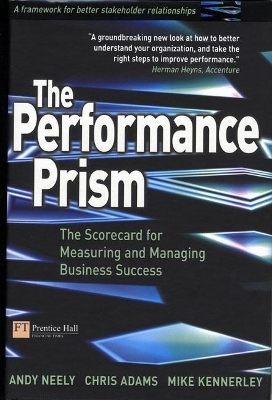
The Performance Prism
Financial Times Prentice Hall
978-0-273-65334-9 (ISBN)
- Titel ist leider vergriffen;
keine Neuauflage - Artikel merken
Understand better what is happening inside your business and identify the real improvement priorities. "You get what you measure," says the old adage. But is your organisation getting what it needs from its existing performance measurement system?
Many organisations have tried various scorecarding approaches, but have found that they didn’t deliver what they wanted. Others have found that 1990s frameworks are inadequate for today’s increasingly complex business environment of multiple priorities and stakeholders.
Apart from shareholders and customers, several other stakeholders have a vital role to play today – such as employees, intermediaries, suppliers, alliance partners, regulators and communities. Stakeholder relationship management is the key to successfully navigating the many pitfalls of managing in this new and rapidly evolving climate.
The Performance Prism
presents an innovative and practical solution to this phenomenon and provides the answers to contemporary managing-with-measures challenges. It puts key stakeholders, and managing the organisation’s relationship with each of them, centre stage with a novel framework. And, unlike some other approaches to the subject, it provides a level of granularity that allows you to implement it successfully.
Just another management theory? On the contrary, the authors – from Cranfield School of Management’s Centre for Business Performance – explain what you need to do, why it needs to be done, and how to do it, illustrated with many examples of both best and worst practice.
We have been informed that some of the CD Roms supplied with this book have had faults. If this is the case with your copy, please contact our Customer Service Team on +44 (0)1279 623923 enq.orders@pearsoned-ema.com for a replacement CD Rom and quote the number ISBN 027366347X.
Andy Neely is Director of the Centre for Business Performance at Cranfield School of Management, Professor of Operations Strategy and Performance and Managing Partner of The Performance Practice. Prior to joining Cranfield Andy held a lecturing position at Cambridge University, where he was a Fellow of Churchill College. He has been researching and teaching in the field of business performance measurement and management since the late 1980s and also co-ordinates the PMA, an international network for those interested in the subject. Andy has authored over 100 books and articles, including 'Measuring Business Performance', published by the Economist. He is widely recognised as one of the world's leading authorities on performance measurement and brings a wealth of practical experience to his teaching and research, derived from his experiences as a consultant to numerous global organisations.
This book takes a radically different look at performance measurement and sets out explicitly to identify how managers can use measurement data to improve business performance. The key features of the proposed book are:
· Critical reviews of the major measurement frameworks available today - including the balanced scorecard, the business excellence model and shareholder value analysis.
· Introduction of a new measurement framework - the performance prism - that addresses the shortcomings of the exisiting measurement frameworks.
· Explanation of the tools, techniques and methodologies that can be used to measure stakeholder satisfaction, strategies, processes, capabilities and stakeholder contribution - the five facets of the performance prism.
· Explanation of how managers can make the most of their measurement data. Specific discussions about how managers can analyse business performance data and identify appropriate improvement priorities.
OUTLINE
Chapter 1 - The Measurement Crisis
This chapter will explore why measurement is on management's agenda and review recent developments in the field. A key theme in the chapter will be the changing nature of the measurement crisis. In the 1980s, when people first started worrying about the effectiveness of their measurement systems, the problem was that we were measuring the wrong things. Today the problem is that we are measuring too much. The chapter will explore this theme and encourage management to take a step back and think clearly about what they want from their measurement systems.
Chapter 2 - The Measurement Frameworks
This chapter will review the major measurement frameworks that are available today and identify their strengths and weaknesses. Frameworks to be covered will include the balanced scorecard, the business excellence model, shareholder value. A key theme that will run throughout the chapter will be the fact that each of these measurement frameworks offers a partial view of business performance.
Chapter 3 - The Performance Prism
This chapter will introduce a new, comprehensive measurement framework - the performance prism. The prism looks at measurement from a stakeholder perspective. When deciding what to measure managers have to first identify who their stakeholders are and what they want and need. Only then can they begin to decide what they should measure. Many of the existing works on measurement fail to recognise this, with numerous authors suggesting that measures should be derived from strategy. Measures should be consistent with strategy, but they should not be derived from strategy. Organisations have strategies because they want to deliver value to stakeholders. Hence the starting point for any discussion of measurement has to be stakeholders. The chapter on the performance prism will build upon this theme and explain how the performance prism provides a structure that encourages managers to answer five inter-related questions when designing their measurement systems:
· Stakeholder satisfaction - who are the stakeholders and what do they want and need?
· Strategies - what strategies do we need to deliver value to stakeholders?
· Processes - what processes do we require to deliver these strategies?
· Capabilities - what capabilities do we require to execute these processes?
· Stakeholder contribution - what do we want and need from our stakeholders to enable all of the above to happen?
Chapter 4 - Measuring Stakeholder Satisfaction
This chapter will explore developments in the measurement of stakeholder satisfaction - investors, customers, employees, suppliers, regulators and local communities.
Chapter 5 - Measuring Strategies
This chapter will explore developments in the measurement of strategy - especially execution and effectiveness.
Chapter 6 - Measuring Processes
This chapter will explore developments in the measurement of pr
| Erscheint lt. Verlag | 27.5.2002 |
|---|---|
| Reihe/Serie | Financial Times Series |
| Verlagsort | Harlow |
| Sprache | englisch |
| Maße | 161 x 241 mm |
| Gewicht | 820 g |
| Themenwelt | Wirtschaft ► Betriebswirtschaft / Management ► Finanzierung |
| Wirtschaft ► Betriebswirtschaft / Management ► Unternehmensführung / Management | |
| Schlagworte | Performancemessung (Wirtschaft) • Stakeholder Value-Konzept |
| ISBN-10 | 0-273-65334-2 / 0273653342 |
| ISBN-13 | 978-0-273-65334-9 / 9780273653349 |
| Zustand | Neuware |
| Haben Sie eine Frage zum Produkt? |
aus dem Bereich


